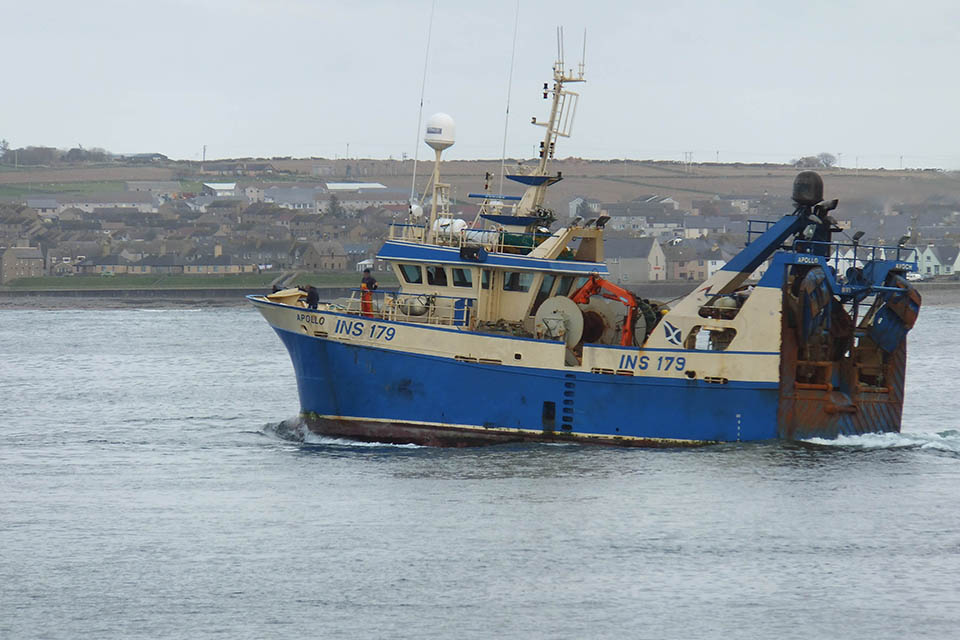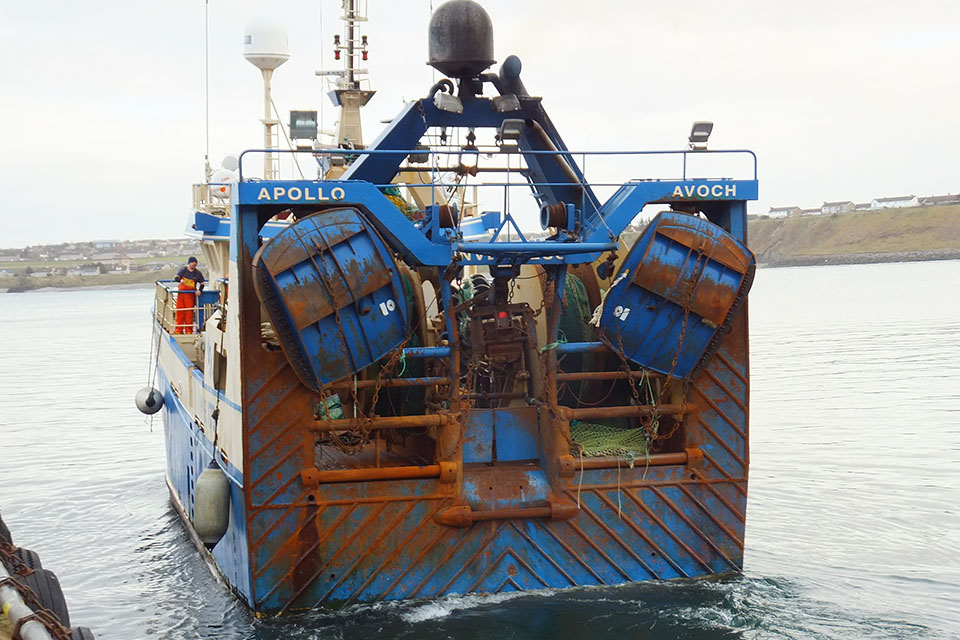Safety flyer to the fishing industry - Apollo
Published 3 November 2016
1. Summary
Fishing vessel Apollo (INS 179) fatal man overboard accident on 18 April 2016
2. Narrative

At 0630 on 18 April 2016 a crewman fell overboard from the stern of the fishing vessel Apollo (INS 179) while its trawl net was being hauled in heavy seas north-west of Orkney. The water temperature was 9°C.
The crewman had been standing on a 1 metre high raised ledge at the stern of the vessel to avoid the large waves that were occasionally washing over the deck while he waited to remove the shooting pole as the net was hauled in. As the trawl wire was being hauled it fouled the shooting pole[footnote 1], which was pulled violently out of its socket before it fell noisily to the deck. As this happened the crewman, who had not been wearing a lifejacket, lost his balance and fell overboard into the water. The alarm was raised and a lifebuoy was thrown towards the man, but he was unable to reach it.
As the crewman drifted away from the stern he managed to grab the bridle wires (doubles) of the trawl and he was heaved back towards the stern of the vessel, where a lifebuoy was lowered down to him.
The crewman released his grip of the wire and put an arm through the lifebuoy, and one of the crew leant over the stern and managed to grasp the top of the man’s oilskin jacket. However, he could not maintain his hold due to the vessel’s rise and fall.
A hook rope, connected to the Gilson[footnote 2] winch, was then lowered down and after several attempts was hooked into the lifebuoy’s grab line. The crew were about to heave on the Gilson rope when the man, who by that time had been in the water for about 7 minutes, released his grip of the lifebuoy and slipped below the surface of the water.
Despite an extensive search by coastguard helicopters, military aircraft and the crew of Apollo, the crewman was not found. His body was recovered several months later.

3. Analysis
The incapacitating effects of immersion in cold water (less than 15°C) are generally not taken into account when fishermen consider how to recover a man overboard back onto the vessel.
In this tragic case, although the manoverboard procedures had been discussed by the crew, no realistic manoverboard emergency drill had been undertaken.
MAIB analysis of many similar accidents shows that in UK waters a person who falls overboard, without a lifejacket, typically loses the ability to help themselves within 10 minutes of entering the water.
4. Safety Lessons
-
The crewman fell overboard while undertaking a task that had not been effectively risk assessed. After the accident the task was reviewed and the need for a crewman to be in an exposed position, to remove the shooting pole, was removed by the installation of a mechanical system.
-
Although the need to wear a lifejacket on the working deck had been identified following a fatal man overboard accident on the same vessel 9 years earlier, the crew had become accustomed to not doing so. The crewman’s chances of survival once in the water were significantly reduced as he was not wearing a PFD.
-
MOB drills should always take into account the effects of cold water incapacitation on the victim. The crewman was a fit young man in good physical health, and he could swim. However, cold water incapacitation resulted in him being unable to retain his hold on the lifebuoy after just 7 minutes in the water.
Our accident investigation report is available at: https://www.gov.uk/maib-reports/man-overboard-from-stern-trawler-apollo-with-loss-of-1-life
For all general enquiries:
Marine Accident Investigation Branch
First Floor, Spring Place
105 Commercial Road
Southampton
SO15 1GH
Email iso@maib.gov.uk
Enquiries during office hours +44 (0)23 8039 5500

